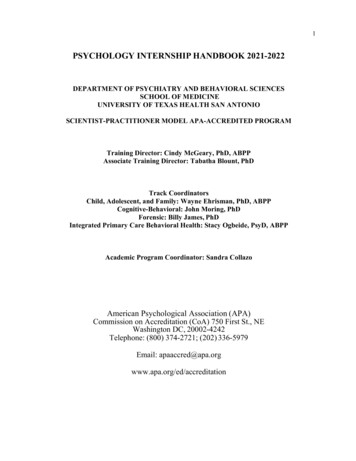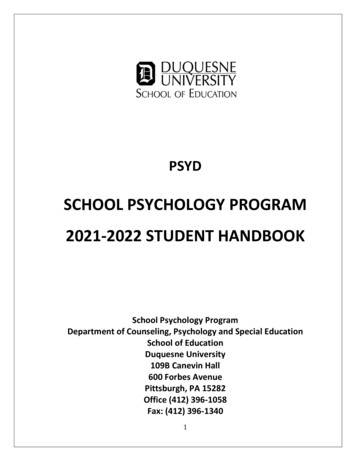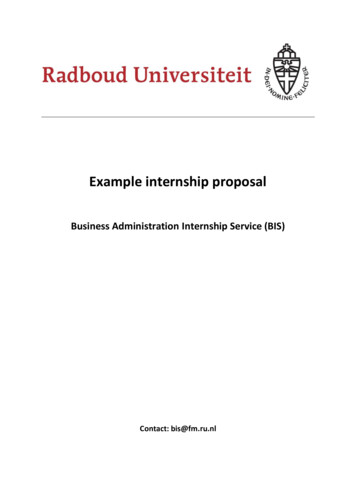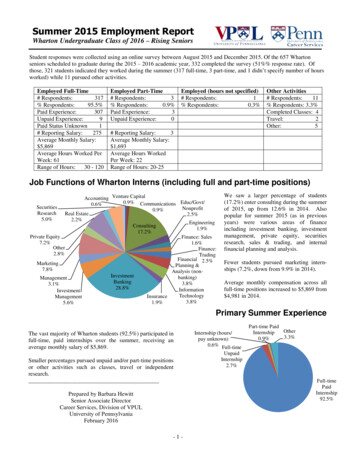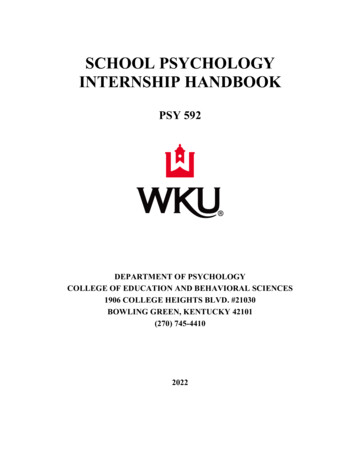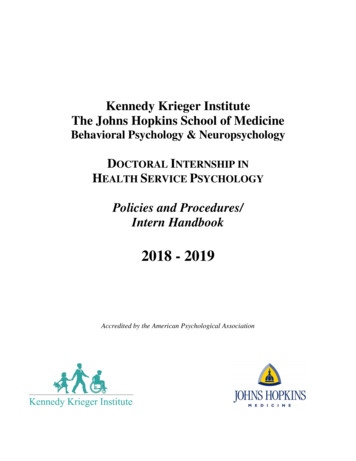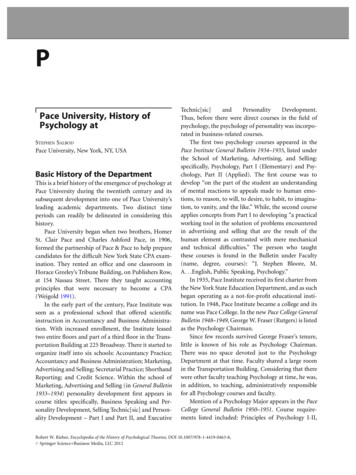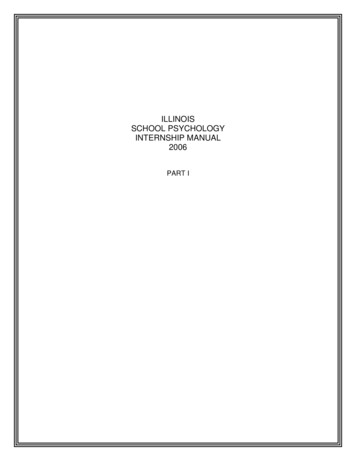
Transcription
ILLINOISSCHOOL PSYCHOLOGYINTERNSHIP MANUAL2006PART I
FORWARDThe Illinois Directors of University School Psychology Programs (DUSPP) are pleased topresent the 2004 edition of the Manual for School Psychology Internship Programs. Thisdocument delineates the purpose of, and requirements for, the school psychology internshipprogram. It supersedes all previous versions of the manual. This document represents aconscientious effort by DUSPP to consolidate internship program requirements and proceduresin a manner which can be easily understood and implemented.The committee that reviewed the previous standards and prepared the revised document forpublication was headed by Nancy Scott and included members of DUSPP and Ruth Brown,principal consultant for school psychological services at the Illinois State Board of Education.Ruth Kelly, Western Illinois UniversityEmily Krohn, Southern Illinois University,Nancy Scott, National-Louis UniversityMark Swerdlik, Illinois State UniversityGregory A. Waas, Northern IllinoisUniversityPaula Wise, Western Illinois UniversityRuth Hilliard Brown, ISBERobert Clark, National-Louis UniversityEllis Copeland, Chicago School ofProfessional PsychologyTracy Cruise, Western Illinois UniversityCal Hainzinger, Homewood-Flossmore HSMichael Havey, Eastern Illinois UniversityJeremy Jewell, Southern Illinois University,The manual was then distributed to the executive committee of the Illinois School PsychologistsAssociation and selected Internship supervisors for feedback.This document is designed to be used in digital form. The Table of Contents includes hyperlinksto the pertinent information as well as links to web sites. It is DUSPP’s plan to update theInternship Manual on a yearly basis.2
TABLE OF CONTENTSTABLE OF CONTENTS. 3CHAPTER ONE. 5Introduction and Purpose of the School Psychology Internship in Illinois . 5CHAPTER TWO . 7Eligibility Criteria for School Psychology Internships and Application Instructions . 7Application Procedures for Entering an Internship . 9Directions for Students from Approved Programs in Illinois . 9Directions for Out-of-State Applicants (Requesting Internship Experience Only). 9Acceptance of Internship . 10CHAPTER THREE . 11State Standards – Knowledge and Performance Indicators. 11Ethics . 24CHAPTER FOUR. 25Requirements for the School Psychology Internship and Site Supervisor . 25Professional Qualifications of Intern Supervisors: . 27Required Characteristics of Intern Supervisors: . 28CHAPTER FIVE. 30Development of the Internship Plan . 30CHAPTER SIX. 31Guidelines for Evaluation of the School Psychology Intern and Internship Program . 31Final Evaluation of the Internship Experience. 32Evaluation of the Approved University Program . 33CHAPTER SEVEN. 34Steps in Obtaining Illinois School Service Personnel Certification in School Psychology . 34Requirements for the School Psychologist Certification and Endorsement. 34Requirements for Bilingual Approval. 35Out of State Applicants Completing the Internship in Illinois. 35Out of State Applicants. 35APPENDIX A . 37Summary of the Procedure for Entering a School Psychology Internship Program Leading to Certification as a SchoolPsychologist . 37By Entitlement:. 373
APPENDIX B . 38ISBE Forms . 38APPENDIX C . 42Questions Students Ask. 42How do I go about getting an internship in Illinois?. 42Are some internship sites better than others?. 44How long does a school psychologist have to be employed by a district or cooperative before they can supervise anintern? . 44What paperwork and other requirements must be completed prior to the internship? What are the requirements toobtain certification after the internship is completed? . 45How is my internship funded, and what is the typical internship salary? . 45What if problems develop during the internship? . 46How will I be evaluated during the internship? . 46Must I do my internship in Illinois?. 46APPENDIX D . 47NASP Standards for Internship Programs . 47Ethics . 48APPENDIX E . 49SAMPLE UNIVERSITY AND SITE AGREEMENT . 49SPECIALIST INTERNSHIP AGREEMENT . 50DOCTORAL INTERNSHIP AGREEMENT. 53APPENDIX F. 56Internship Plan – Possible Activities for Performance Indicators . 56APPENDIX G . 73INTERNSHIP PLAN. 73PART II.Error! Bookmark not defined.APPENDIX H .Error! Bookmark not defined.HITTING THE GROUND RUNNING AS AN INTERN: FIRST 72 HOURS .Error! Bookmark not defined.TASK DESCRIPTION .Error! Bookmark not defined.APPENDIX I .Error! Bookmark not defined.“SCAVENGER HUNT” OF ESSENTIAL INTERN ACTIVITIES.Error! Bookmark not defined.APPENDIX J .Error! Bookmark not defined.USER-FRIENDLY INTERNSHIP PLAN, SUGGESTED ACTIVITIES, AND RESOURCES.Error! Bookmark not defined.Explanation of Appendix J .Error! Bookmark not defined.85 SELECTED ACTIVITIES FROM APPENDIX F .Error! Bookmark not defined.4
CHAPTER ONEIntroduction and Purpose of the School Psychology Internship in IllinoisSchool psychology is a complex, dynamic and exciting profession. School psychologists inIllinois work with children from birth through age 21 who have a variety of abilities anddisabilities. School psychologists assist teachers, parents and other professionals involved inthe educational process to provide optimum teaching and learning conditions for all students.They provide consultation to regular and special education personnel; collaborate with teachersand other school staff in decision-making processes; intervene in times of crisis; help to developschool-based prevention programs; counsel students, parents and teachers on educational andmental health issues; administer and interpret psychological and educational evaluations; helpdisseminate the results of research projects; act as change agents in order to help implementsystem-wide modifications in the school districts they serve; and act as liaisons between thepublic schools and community agencies.In order to function effectively in all of these roles, school psychologists must have a thoroughunderstanding of many areas of psychology and education. They must be able to communicateclearly as they apply this knowledge, using a combination of tact, caring and professionalism.School psychologists act as advocates for children while remaining sensitive to the protocol andpolitics within school environments and their professional ethics. They keep up-to-date onsocietal changes; current educational and psychological research findings; medical advances;legal decisions; national, state, and local legislative and policy issues.School psychology training programs provide students with academic experiences throughwhich the students acquire a firm grounding of relevant areas of psychology and education; theyalso provide initial opportunities for students to apply their newly-acquired knowledge in schoolsettings. Training programs prepare students for changes within the field of school psychologyby helping them to learn problem-solving techniques, by teaching them to be competentconsumers of research, and by providing opportunities that require adaptation to a variety ofsettings and circumstances.Internship is the culminating experience in school psychology graduate preparation and occursafter required coursework and practica have been completed. It is a comprehensive experience,through which the student is required to integrate the knowledge base and applied skills ofschool psychology in promoting positive educational and mental health practices and inresolving individual, group and system-level problems. The internship represents a collaborativeeffort between the university training program and the internship site. The importance of theinternship is recognized by awarding academic credit for the internship year. Internship settingsshall be appropriate for the goals and objectives of the training program. They should afford thestudent opportunities to work with diverse client populations, a range of problems andintervention methodologies, and a variety of different human service programs.5
The internship is designed to provide a supervised transition period between the relativelysheltered learning environment of a university training program and the “real world” of schoolpsychology practice. Internships provide opportunities to apply the knowledge and skillsacquired during training in real-life settings, as well as to acquire additional knowledge andskills. Internships also give interns a firsthand look at the day-to-day routine of the schoolpsychologist – how to balance the various demands of the job, how to complete the requiredpaperwork, and how to manage time effectively. Ideally, the development of these new skillsand competencies will facilitate the transition from the role of the school psychology student tothe role of competent educational and mental health professional.In addition to learning firsthand about the roles and functions of school psychologists, internsobserve the roles and functions of other professionals in the schools with whom schoolpsychologists work closely, e.g., classroom teachers, school administrators, school counselorsand social workers, speech and language pathologists, and school nurses. Interns becomefamiliar with the workings of public school systems, and also the agencies and resourcesavailable outside the public schools. The internship is the time to gain a working knowledge ofregular and special education. In order to become effective practitioners, interns must developan understanding not only of school psychology itself, but also of where school psychology fitswithin the total educational system.At the specialist level, the intern is employed in a school setting and works full-time for that unitfor one school year, under the close supervision of a certified school psychologist who meetsthe standards set by the Illinois State Board of Education for supervising school psychologyinterns. In some rare instances, the internship can be extended over a two-year period, duringwhich the intern is employed on a half-time basis. Universities maintain contact with internsthrough at least one on-site contact per semester by university personnel, on-campus seminarsfor interns, letters and telephone contacts with each intern and supervisor. It is generally the onsite supervisor, however, who provides the day-to-day supervision.At the doctoral level, the internship must include a minimum of one academic year of a doctoralsupervised internship experience. Doctoral candidates, who have met the school-basedinternship requirement through a specialist-level internship or equivalent experience, maycomplete the doctoral internship in a non-school setting if consistent with university programvalues and goals. University program policy shall specifically define equivalent experiences andexplain their acceptance with regard to doctoral internship requirements.The internship is a learning and training experience that stresses the quality and variety ofexperiences available to the intern. In the training process, there will inevitably be some serviceprovided to the employing district. However, it cannot be stressed too strongly that the primarypurpose of the internship is the training of the intern rather than service to the schooldistrict.6
CHAPTER TWOEligibility Criteria for School Psychology Internships and Application InstructionsThe only available route for approval as a school psychologist intern for Illinois residents is uponthe endorsement of an Approved University Program. The oversight of the internship is theresponsibility of the university program. Site and supervisor approval by ISBE is not necessary.The Directory of Approved Programs for the Preparation of Educational Personnel in IllinoisInstitutions of Higher Education (1994) lists all recognized Illinois institutions. The following areapproved university graduate programs in school psychology:Chicago School of Professional PsychologySchool Psychology Program325 N. Wells St.Chicago, IL 60610312-329-6684 or 312-329-6631Degree Conferred: MA (EdS Pending)Eastern Illinois UniversityDepartment of PsychologyCharleston, IL 61920Phone: 217/581-3523 or 581-2127Degrees Conferred: SSP(NASP/NCATE Approved)Illinois State UniversityDepartment of PsychologyCampus Box 4620Normal, IL 61790-4620Phone: 309/438-5720Degrees Conferred: SSP and Ph.D.(SSP & Ph.D. NASP/NCATE Approved)(Ph.D. APA Accredited)Loyola University ChicagoDepartment of Curriculum, Instruction and EducationPsychology820 N. Michigan AvenueChicago, IL 60611Phone: 312/915-6800Degrees Conferred: M.Ed/Ed.S. and Ph.D.(Ed.S.NASP/NCATE Approved & Ph.D. NASP Approved)7
National-Louis UniversitySchool Psychology Program2840 N. Sheridan RoadEvanston, IL 60201Phone: 847/475-1100, Ext. 2724Degrees Conferred: Ed.S. and Ed.D.(Ed.S. NASP/NCATE Approved)Northern Illinois UniversityDepartment of PsychologyDeKalb, IL 60115Phone: 815/753-3508Degrees Conferred: M.A. and Ph.D.(M.A. NASP/NCATE Approved)Southern Illinois UniversityEdwardsvilleDepartment of PsychologyBox 1121Edwardsville, IL 62025Phone: 618/650-2202Degrees Conferred: M.S. and SSP(SSP NASP/NCATE Approved)Western Illinois UniversityDepartment of PsychologyMacomb, IL 61455Phone: 309/298-1919Degree Conferred: SSP(NASP/NCATE Approved)CODESM.S.-Master of ScienceM.A.-Master of ArtsEd.S.-Education SpecialistSSP-Specialist in School PsychologyPh.D.-Doctor of PhilosophyEd.D.-Doctor of EducationNASP-National Association ofSchool PsychologyAPA-American PsychologicalAssociation8
Application Procedures for Entering an InternshipDirections for Students from Approved Programs in IllinoisEach university student seeking approval as a school psychologist intern mustsubmit ISBE Form 73-44, “Notification of School Service Personnel InternEligibility Status.” The application process includes the following:1234The intern must obtain a copy of ISBE Form 73-44 from theDirector of the Approved University Program, the Division ofProfessional Preparation, or the Regional Office of Education.The intern must complete all personal information on the form.Interns from in-state institutions must have Section II completedand signed by the Director of the Illinois Approved UniversityProgram and by the Authorized Official of the university andstamped with the university seal.The university retains one copy of the form and forwards theoriginal and one copy to the intern.The intern submits the original to the employing school district orcooperative.School service personnel interns qualify for special education reimbursement as“professional workers” under Article 14-1 of the School Code of Illinois.12Internship site administrators must complete and sign ISBE Form73-42, “Request for Approval of Other Special EducationPersonnel.” This form, along with ISBE Form 73-44, must beforwarded to a Regional Superintendent of Schools for subsequentsubmission to the Illinois State Board of Education, ProfessionalPreparation Division, for processing.Upon receipt of ISBE Forms 73-44 and 73-42, and a determinationthat the forms have been completed correctly, the intern will begranted reimbursement approval. This approval is necessary toqualify for special education personnel reimbursement onISBE Form 50-44.State forms can be found in Appendix B.Directions for Out-of-State Applicants (Requesting Internship ExperienceOnly)Out-of-state intern candidates may apply for an internship experience in Illinoisby submitting a completed, signed, and sealed “Notification of School ServicePersonnel Intern Eligibility Status” (ISBE form 73-44) from a NASP and NCATEapproved university program to the internship program coordinator. Theinternship program coordinator will submit this form, along with the “Request for9
Approval of Other Special Education Personnel” (ISBE Form 73-42) to theRegional Superintendent of Schools. A letter of approval to enter a schoolpsychologist internship will be issued by the Division of Professional Preparationif the applicant has completed coursework that meets Illinois certificationrequirements and if s/he will be certifiable upon completion of the internship inthe state where s/he is attending a NCATE/NASP approved school psychologyprogram.The internship plan, site and supervisor approval, and oversight of the on-goingprogress of the intern are the responsibility of the out-of-state university programadministrator.State forms can be found in Appendix B.Acceptance of InternshipThe university training directors and governing board of ISPA has set a policy onaccepting school psychology internships. Internship applicants cannot accept adistrict offer prior to March 1st for the following academic school year.Students may visit internship sites and interview prior to March 1st, but cannotofficially accept an internship offer.10
CHAPTER THREEState Standards – Knowledge and Performance IndicatorsSTANDARD 1 – Data-Based Decision Making and AccountabilityThe competent School psychologist has knowledge of varied models andmethods of assessment that yield information useful in identifying strengths andneeds, in understanding problems, and in measuring progress to collect data andother information, translate assessment results into empirically-based decisionsabout service delivery, and evaluate the outcomes of services. Data-baseddecision-making permeates every aspect of professional practice.Knowledge Indicators: The competent school psychologist1A.Understands effective, data-based decision-making and problemsolving-processes.1B.Understands the purposes, characteristics, strengths, andlimitations of formal and informal models and methods ofassessment (e.g., interviewing techniques, norm-referencedcognitive and achievement tests, curriculum-based assessment,authentic assessment, portfolio assessment; criterion-referencedassessment, functional assessment, behavioral assessment,behavioral observation, social developmental history, and adaptivebehavior assessment) for the purposes of data collection.1C.Understands child development, learning theory, and diversity aswell as their relationship to data-based decision making.1D.Understands psychometric theory, test development, and researchas applied to data-based decision making.1E.Understands nondiscriminatory evaluation procedures.1F.Understands the process of linking assessment results with thedevelopment of interventions.1G.Understands the importance of linking system-wide assessmentdata with district curricular decisions.1H.Understands the importance of considering cultural, linguistic, andother experiential factors when interpreting and using data.1I.Understands the importance of collecting data acrossenvironments.1J.Understands how to modify intervention plans based on data.1K.Understands the use of technology in data-based decision making.1L.Understands the use of data in evaluating intervention integrity.1M.Understands the use of data in determining the areas ofexceptionality as defined in the federal and state statutes (e.g.,Section 504 of the Rehabilitation Act, Individuals with Disabilities11
1N.1O.Act (IDEA), Americans with Disabilities Act (ADA) and the IllinoisAdministrative Code).Understands parents’/guardians’ and students’ rights regardingassessment and evaluation.Understands the principles and importance of professionalaccountability for confidentiality and record keeping.Performance Indicators: The competent School Psychologist1P.Applies child development, learning theory, diversity, and therelationship of curriculum to data-based decision making.1Q.Collects assessment results and other data to identify studentlearning needs, establish goals, align and modify curriculum andinstruction, and design intervention strategies.1R.Uses data to evaluate outcomes of services and to facilitateaccountability.1S.Uses environmental data (e.g., data from home, school,community) to plan interventions.1T.Applies psychometric theory to the evaluation of assessmentmaterials and techniques.1U.Applies knowledge of research findings and methodology to theevaluation of curricula and other instructional materials.1V.Uses nondiscriminatory evaluation procedures.1W.Analyzes group performance to design interventions that meetlearners' needs.1X.Uses technology to monitor programs and to assist in theassessment of individual, group, and system-wide interventions.1Y.Uses technology to administer, score, and interpret psychologicalassessment techniques in a professionally appropriate and ethicalmanner.1Z.Prepares clearly written reports that address referral questionsappropriately, report data accurately, and provide guidance forinterventions.1AA.Articulates assessment findings in a manner that is understandablefor the intended audience.1BB.Uses data to identify factors that influence learning and behavior atthe classroom or building, levels.1CC.Assists school personnel and other agency administrators with theinterpretation of data to evaluate classroom and/or building -levelprograms.1DD.Follows legal, regulatory, and ethical parameters in data-baseddecision making and record keeping.12
STANDARD 2 – Consultation and CollaborationThe competent school psychologist has knowledge of behavioral, mental health,collaborative, and/or other consultation models and methods and of theirapplications to particular situations. The competent School Psychologistcollaborates effectively with others in planning and decision-making processes atthe individual, group, and system level.Knowledge Indicators: The competent school psychologist2AUnderstands behavioral, mental health, collaborative, and otherconsultation approaches and their application to particularsituations.2BUnderstands the dynamics of communication skills applicable tocollaboration and consultation in professional practice.2CUnderstands the importance of interpersonal skills in theconsultation process.2DUnderstands schools as organizations within the larger communitycontext.2EUnderstands skills necessary to facilitate communication withstudents.2FUnderstands skills necessary to facilitate communication amongteams of school personnel, families, community professionals, andothers.2GUnderstands the important feature
The Illinois Directors of University School Psychology Programs (DUSPP) are pleased to . approved university graduate programs in school psychology: . 325 N. Wells St. Chicago, IL 60610 312-329-6684 or 312-329-6631 Degree Conferred: MA (EdS Pending) Eastern Illinois University Department of Psychology Charleston, IL 61920 Phone: 217/581 .
